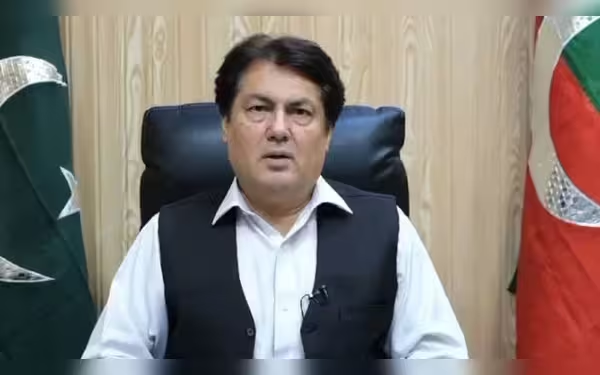Saturday, December 28, 2024 02:54 AM
PTI Denies Murad Saeed's Alleged Hiding in KP CM House
- PTI rejects claims of Murad Saeed hiding in Peshawar.
- Barrister Saif questions government's ability to arrest Saeed.
- Violence during protests leads to tragic casualties on both sides.
 Image Credits: geo
Image Credits: geoPTI leader Murad Saeed's alleged hiding in KP CM House is denied, raising questions about government claims amid ongoing political tensions.
On December 1, 2024, the political landscape in Pakistan witnessed a significant development as the Khyber Pakhtunkhwa government's spokesman, Barrister Mohammad Ali Saif, firmly rejected claims made by the federal government regarding Pakistan Tehreek-e-Insaf (PTI) leader Murad Saeed. The government alleged that Saeed was hiding at the Chief Minister's House in Peshawar, a claim that has sparked considerable debate and controversy.
During an appearance on the Geo News program "Naya Pakistan," Barrister Saif stated, "If they had seen Murad Saeed, they would have arrested him." This statement raises questions about the government's ability to apprehend individuals they claim are in hiding. Saif further challenged the government, asking why they did not arrest Saeed if he was indeed spotted during a protest in Islamabad.
In response to allegations of violence during the protests, Barrister Saif asserted that PTI protesters were unarmed and accused law enforcement agencies of opening fire on them. He expressed his belief that the government was misleading the public about the events that transpired. He also mentioned that the PTI founder had permitted them to stage a protest demonstration in Sangjani, a locality in Islamabad.
The controversy intensified following remarks made by Information Minister Attaullah Tarar, who claimed that Saeed had absconded after the riots on May 9 and was being sheltered in the PTI-ruled province. Tarar alleged that Saeed was seen leading a group of supporters armed with weapons, which were reportedly recovered from the scene after their arrest. This assertion has been met with skepticism from PTI leaders.
Last month, the PTI organized a march on Islamabad in response to party founder Imran Khan’s "final call," despite a court order prohibiting such protests. The situation escalated into fierce clashes between law enforcement and protesters, resulting in the tragic deaths of at least five security personnel, including three Rangers and two policemen. Conversely, the PTI claimed that twelve of their supporters lost their lives during the unrest.
In a press conference, Tarar challenged the PTI to provide video evidence supporting their claims of law enforcement agencies using live ammunition against protesters. He stated, "I have shared the video evidence that shows how a person from the protest told the protesters to open indiscriminate fire at the police." This back-and-forth highlights the ongoing tension between the government and the PTI, with both sides accusing each other of spreading misinformation.
Tarar also dismissed the PTI's claims of "straight-firing" by law enforcement, asserting that the PTI had a history of inciting violence during protests, particularly during significant foreign visits to Pakistan. He emphasized that the government would uphold the rule of law and maintain public safety at all costs, stating, "States never bow down before anyone."
The situation remains fluid, with both sides entrenched in their positions. As the political climate in Pakistan continues to evolve, it is crucial for citizens to stay informed and critically evaluate the information presented by both the government and opposition parties. The ongoing conflict not only affects the political landscape but also has broader implications for the stability and security of the nation.













